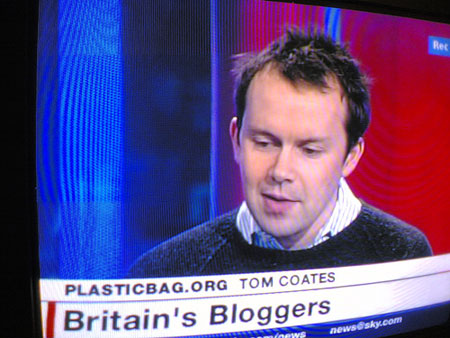Television is such a strange enterprise! I don’t really know how else to put it. I get an e-mail in the afternoon from Tim Levell at Sky News saying that they’re looking for someone vaguely clued-up to talk about weblogs that evening. I ask a few questions and get a bit nervous, and chat to a couple of friends and then decide that sure – even though I’m scared to death by the whole idea of live television, it’s not exactly an opportunity you get every day. So I have a shower, find a shirt that doesn’t look too bad, and scrabble around for a sweater that isn’t still damp from the wash and wait patiently for the doorbell to ring.
They’re sending a cab to collect me, which is great but still a bit weird – the journey to the studio will be about forty-five minutes, with one dedicated guy organised to drive me both to and back from somewhere west of Hammersmith. I find it difficult to believe that anything anyone could say on weblogs in three minutes would be worth however much an hour and a half taxi ride must cost, but then after two years at the BBC I find many things that go on in the world of business extravagant in the extreme. I flew Premium Economy the other day! Can you even imagine! Anyway, the drive is long and makes me sleepy and I’m stuck reading some random magazine with a big feature on Bruce Springsteen and trying to make polite conversation with the driver and desperately trying not to feel like I’m somehow an exploitative √ºber-capitalist exploiting the common man.
Sky News appears to be located in a rather depressing industrial park near a motorway, and at first impressions, the whole place is much less intimidating than I’ve been expecting. It’s a completely different kind of environment to the BBC’s news rooms for a start. Stage one is to get into the building – all you can really say is, “Er, hi! I’m coming to … er … be on the news, I guess!” They don’t bat an eyelid of course. And then – having been collected – it’s a ten-second walk directly past the studio and into make-up – the kind of walk you’d take from your front door to your kitchen. It’s that close.
The woman in make-up looks me over and asks if ‘that’s’ what I’m going to be wearing on TV, which was nice. Then I’m sat down and she starts to brush me with a variety of orange shades. “What are you going to be talking about?”, she asks. “I’m going to be talking about weblogs,” I reply. “Oh, really,” she smiles, “You have to ask sometimes, does anybody really care!?” Potentially too difficult a question to answer, I demur and we talk about where I work instead.

And then after a few seconds in an actual green room devouring biscuits, I’m out on the floor talking to the newsreader Jeremy Thompson. While the previous video feature was on he chatted to me, calming me down a bit, showing me how things worked and talking about a few of the weblogs that I’d recommended beforehand, and then I watched as he did a feature about icons of Britishness (featuring Photoshop mock-ups of the Queen). And then suddenly I’m on and he’s asking me questions and I’m stumbling a bit with my language and hopefully not looking like too much of an idiot. And then – as soon as it’s begun – it’s over! And I walk out talking to Tim again, and within a few minutes I’m full of adrenalin and back in a cab heading for Central London.
Unfortunately, I have no idea whatsoever what I was like – as my Tivo refused to record the right channel. My father said that I looked okay and that he couldn’t tell whether it was the make-up or not, but it looked like I’d shaved, which was good. Unless anyone out there happens to have access to a ripped stream of the whole debacle, the best I’ve got is a couple of photos taken by some lovely friends and posted on Flickr for people to mock:


Well anyway, there were some lovely comments on my post yesterday, so thanks for the support guys (but I don’t trust you lot either)! Anyway, there’s more detail from the other perspective over on Jeremy Thompson’s weblog (which I have now confirmed is actualy written by him), which contains some of the weblogs I recommended that might like to mention on air. I think I specifically mentioned Random Acts of Reality, Dooce and Green Fairy on air – although to be honest the whole thing’s a bit fuzzy in my head.





